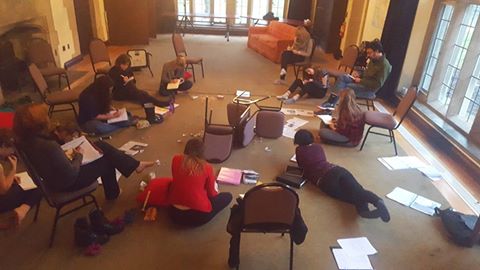(This post is by Amelia Couderc, BMC class of 2016.)
Today in rehearsal we “opened a can of worms.”
In our work with Stanton, we’ve experimented with different ways of telling the story of King Lear in our own words. Making sense of Shakespeare and Lear can be somewhat daunting and condensing or synthesizing all of the events/characters/themes of the play is a difficult task. So we played with how to tell the story as if we were addressing a class of kindergartners. In telling the story this way, we developed ways to enhance and make sense of each act with our Stanton groups. I worked with Cathy and Sam. The exercise really helped me understand elements of the plot that had been fuzzy before. And, for me, it pulled King Lear out of an antiquated and stuffy academic place into one that was more whimsical and clear.
In rehearsal today, we used this model of telling the story of King Lear in our own words, act by act, but changed the given circumstances. What if we were telling the story of Lear to each other? What if we were all God’s spies meeting on the bank of the river Seine at night, gathered around the campfire to tell the French existentialist version of Lear? And thus the can of worms was opened….
Our ensemble accesses the world of King Lear through the body and mind of the God’s spy. God’s spies are the observers of the world; they are the spies of God. They see the world very clearly from a cosmic perspective. God’s spies are humans who live normal lives (my God’s spy character likes to hike where moss grows), but they gather every so often to tell the story of King Lear. Once we sit at the table, our “stage,” and begin our retelling/re-sharing, the God’s spies can access any character they choose to. But once a person stands for a character, it is theirs. The God’s spies can echo or reinforce a character that is already “stood for,” but they can’t stand for them. Once I (as a God’s spy) stand for Edmund, I am Edmund (but still a God’s spy). This allows for us to step in and out of our “Lear character” as we see fit.
I like to think of my God’s spy character as a conduit for story–for the play.
As God’s spies we gathered today to the tell the existentialist Lear.
However, as the retelling was taking place, we were given the prompt by our directors of creating “illuminations.” These illuminations were moments in which we could step in to the story as it was told and share a piece of our Lear character. The illuminations could manifest in many different ways, external or internal. Here are just some of the external illuminations I witnessed during our retelling today:
Cordelia passing a pillow to Lear. Lear accepting.
Lear standing on a bench out in the rain
Gloucester sorting through newspapers
Edgar blowing on glass bottles in the fireplace
Cornwall firmly stomping boots

As all of the illuminations took place alongside the retelling, the thread of story never faltered. The stable through-line of our existentialist King Lear allowed for the illuminations to wander off into unknown territories.
I left the experience feeling like our gathering generated a beautiful series of attempts, choices, and studies in character and presence.
